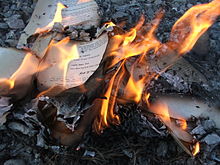Two American classics, The Adventures of Huckleberry Finn and To Kill a Mockingbird, are again under assault. People have been calling for bans on these books since they were first printed.
Generally, two reasons explain why someone tries to ban a book. The first is the person’s ignorance of the book’s message. The second is that the person understands the message but fears it. In this case, both reasons might apply.
My purpose isn’t to advertise the name of the woman who called for the books’ ban or to draw attention to the school district temporarily and foolishly banning the books when they know exactly what they’re about. Interested readers can easily find this information. I’m here to counterpunch. An assault on any book, from the Bible to The Anarchist’s Cookbook, is an assault on all books. It contributes to America’s ever-growing anti-intellectualism and adulation of ignorance, which is often conflated as concern over someone’s emotions.
The worried mother claims the n-bombs in Twain and Lee disturb her biracial teenage son. Of course, instead of asking her son to be excused from reading, she wants the books removed completely. Her rationale: “I’m not disputing this is great literature. But there is so much (sic) racial slurs in there and offensive wording that you can’t get past that, and right now we are a nation divided as it is.”
Claiming offensive language interferes with whatever the books are saying is, in fact, a dispute of the books’ greatness. She either hasn’t read or misunderstands Lee and Twain. Her concern for a divided nation is transparent; because her boy finds the books offensive, she feels the rest of the school should as well.
Ironically, both these books provoke discussion about the nature of equality and unity. Curiously, the woman uses the same critique employed by people who fear what ideas these books might provoke.
These books should be difficult for any boy, biracial or otherwise. Great books slap us silly, shake us up and kick us. If the woman could “get past” the offensive word, one that should offend us in 2016, and battle through what violence children witness in the narratives (Huck’s dad is an abusive drunk, for example, and Scout haphazardly stops a lynch mob from murdering Tom Robinson), she could stumble into seeing that both Twain and Lee littered their books with n-bombs, in 1884 and 1960, respectively, while essentially arguing that black lives matter.
In short, these books agree that the biracial boy should be offended not only by words but by his society. Another lesson is that Twain and Lee are also provoking his Caucasian peers to see the consequences of racism.
That’s among the many reasons these books are part of our canon, and also why people have feared Twain and Lee’s critiques for as long as the books have existed.
* * *
Literature has always been a threat to those fascists who want to bait us into hating each other. They know it’s a remedy to growing inequality and division. I’ve met very few people who consumed it in large quantities but came away hateful, afraid of their fellow man.
Having consumed it in large quantities myself, I’ve learned it radical in 1884 to claim black people were human beings deserving of equal rights, just as it was radical to make the claim in 1960, and it obviously remains radical today. If not, it should offend no one to hear the phrase black lives matter. People should hear it and think, “Yeah, no shit.”
Despite my life in letters, I know far more Americans who see no use for literature. So many believe individual words are more offensive than the act of banning them. These people are everywhere; I’ve found them in HR offices and among the administrators in schools. Our president-elect has no use for literature, just as most of his supporters seem to care little for it. Forget about great books—sketch comedy offends them.
People fear books because they want their flawed ideas and hatred either justified or hidden while they get to control the narrative. That has been the only reason books have ever been hated and burned, the only reason their makers are demonized as unpatriotic and brought out to face firing squads.
Of course, my critics will point out that this woman has the best intentions. She’s a leftist who wants a safe space for her kid, and she’s trying to protect him from racism. That misses the point. Her impulse might be to protect her boy, and she’s right to find the word offensive. But right beside this affront is an impulse to make everyone do as she likes.
It’s exactly the impulse of someone who has either read too few books or failed to gain their most important lessons.

Photo, book burning, from Wikipedia.
“Remember it’s a sin to kill a mockingbird.” That was the only time I ever heard Atticus say it was a sin to do something, and I asked Miss Maudie about it. “Your father’s right,” she said. “Mockingbirds don’t do one thing but make music for us to enjoy . . . but sing their hearts out for us. –Harper Lee

You must be logged in to post a comment.